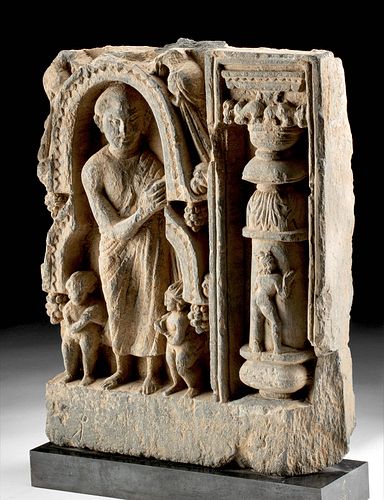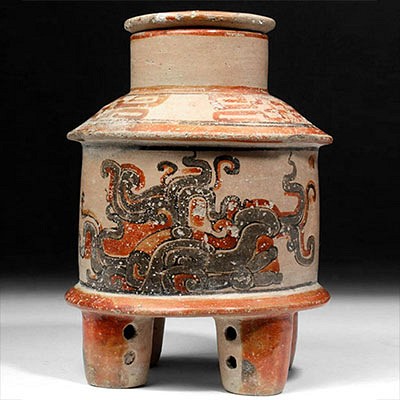Gandharan Schist Relief Panel w/ Man, Putti, and Column
Lot 108
About Seller
Artemis Fine Arts
686 S Taylor Ave, Ste 106
Louisville, CO 80027
United States
Selling antiquities, ancient and ethnographic art online since 1993, Artemis Gallery specializes in Classical Antiquities (Egyptian, Greek, Roman, Near Eastern), Asian, Pre-Columbian, African / Tribal / Oceanographic art. Our extensive inventory includes pottery, stone, metal, wood, glass and textil...Read more
Estimate:
$4,500 - $6,750
Absentee vs Live bid
Two ways to bid:
- Leave a max absentee bid and the platform will bid on your behalf up to your maximum bid during the live auction.
- Bid live during the auction and your bids will be submitted real-time to the auctioneer.
Bid Increments
| Price | Bid Increment |
|---|---|
| $0 | $25 |
| $300 | $50 |
| $1,000 | $100 |
| $2,000 | $250 |
| $5,000 | $500 |
| $10,000 | $1,000 |
| $20,000 | $2,500 |
| $50,000 | $5,000 |
| $100,000 | $10,000 |
| $200,000 | $20,000 |
About Auction
By Artemis Fine Arts
Jul 22, 2021
Set Reminder
2021-07-22 10:00:00
2021-07-22 10:00:00
America/New_York
Bidsquare
Bidsquare : Summer Antiquities & Ethnographic Art Auction
https://www.bidsquare.com/auctions/artemis-gallery/summer-antiquities-ethnographic-art-auction-7245
Travel around the world and back in time...and be amazed at the treasures you will find! Antiquities from Egypt, Greece, Italy and the Near East, Asian, Pre-Columbian, African / Tribal / Oceanic, Native American, Spanish Colonial, Russian Icons, Fossils, Fine Art, much more! Artemis Fine Arts info@artemisgallery.com
Travel around the world and back in time...and be amazed at the treasures you will find! Antiquities from Egypt, Greece, Italy and the Near East, Asian, Pre-Columbian, African / Tribal / Oceanic, Native American, Spanish Colonial, Russian Icons, Fossils, Fine Art, much more! Artemis Fine Arts info@artemisgallery.com
- Lot Description
Northwest Pakistan, Gandharan Empire, ca. 2nd to 3rd century CE. A remarkable schist panel depicting a standing man surrounded by a pair of putti next to an ornate column, all skillfully carved in high relief. Draped in a toga, the male figure stands in contrapposto and turns to his left, exposing his right arm which stretches across his slender body. His ancient visage presents a pointed nose, pursed lips, wide eyes, and long ears, all under a thick head of hair. A pair of putti flanks the central figure, standing beside his feet, also in contrapposto, and with their outside arms extending inward across their torsos. All three are framed by a lovely archway decorated with a triangular border and surrounded by bunches of grapes and a pair of curtains. To their left is a non-traditional column featuring several registers of geometric and vegetal designs, along with a highly detailed shaft exhibiting the back of a nude man. Size: 11" W x 13.75" H (27.9 cm x 34.9 cm); 15.5" H (39.4 cm) on included custom stand.
The column is surrounded by an incised border, separating it in time and space from the male figure and the putti, and suggesting it may serve as a division between narrative scenes of the relief. A petite mason's mark can be found in the lower left corner of the panel.
The Gandharan Empire made itself wealthy in part by controlling lucrative trade along the mountain passes between China in the East and the Near East and Mediterranean in the West; a great deal of this wealth went into local patronage of artisans and art. In the first century CE, Buddhism became fashionable amongst Gandharan elites, and the art produced at this time included some of the most striking Buddhist images from the past. Their artistic tradition also reflects the conquest of Alexander the Great and the introduction of Western aesthetics, blended into a uniquely Gandharan tradition.
Provenance: ex-private New Jersey, USA collection; ex-Estate of Roslyn Willett, New York City, New York, USA, acquired from Michael Cohen Asian Art, New York City, New York, USA on January 1, 1993
All items legal to buy/sell under U.S. Statute covering cultural patrimony Code 2600, CHAPTER 14, and are guaranteed to be as described or your money back.
A Certificate of Authenticity will accompany all winning bids.
PLEASE NOTE: Due to recent increases of shipments being seized by Australian & German customs (even for items with pre-UNESCO provenance), we will no longer ship most antiquities and ancient Chinese art to Australia & Germany. For categories of items that are acceptable to ship to Australia, please contact us directly or work with your local customs brokerage firm.
#162172Mason mark in lower left corner of panel. Fragment of a larger piece. Expected nicks/chips and abrasions commensurate with age. Otherwise, excellent with nice earthen deposits throughout.Condition
- Shipping Info
-
All shipping is handled in-house for your convenience. Your invoice from Artemis Gallery will include shipping calculation instructions. If in doubt, please inquire BEFORE bidding for estimated shipping costs for individual items.
-
- Buyer's Premium



 EUR
EUR CAD
CAD AUD
AUD GBP
GBP MXN
MXN HKD
HKD CNY
CNY MYR
MYR SEK
SEK SGD
SGD CHF
CHF THB
THB














